高一英语情态动词
- 格式:pdf
- 大小:1.18 MB
- 文档页数:9
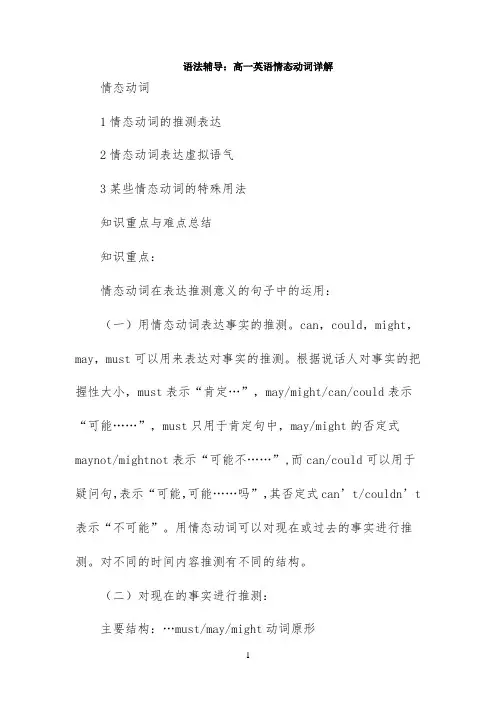
语法辅导:高一英语情态动词详解情态动词1情态动词的推测表达2情态动词表达虚拟语气3某些情态动词的特殊用法知识重点与难点总结知识重点:情态动词在表达推测意义的句子中的运用:(一)用情态动词表达事实的推测。
can,could,might,may,must可以用来表达对事实的推测。
根据说话人对事实的把握性大小,must表示“肯定…”,may/might/can/could表示“可能……”,must只用于肯定句中,may/might的否定式maynot/mightnot表示“可能不……”,而can/could可以用于疑问句,表示“可能,可能……吗”,其否定式can’t/couldn’t 表示“不可能”。
用情态动词可以对现在或过去的事实进行推测。
对不同的时间内容推测有不同的结构。
(二)对现在的事实进行推测:主要结构:…must/may/might动词原形be名词/形容词/介词短语bedoing例句:(三)对过去的事实进行推测:结构:情态动词havedone/been名词/形容词/介词短语例句:情态动词表达虚拟语气:表达“本来…”,“不然早就…”。
这是情态动词的一种虚拟语气用法。
表示说话人所讲的与所发生的事实相反。
表达了说话人的埋怨,后悔的语气。
其结构是在一些情态动词后面加havedone结构。
根据要表达的意思,有如下结构:shouldhavedone/oughttohavedone:本应该……shouldn’thavedone/oughtn’ttohavedone:本不该……couldhavedone:本来可以……needn’thavedone:本来没必要……wouldlietohavedone:本来很想……wouldrathernothavedone:本来不愿意……could/might/havedone:不然早就……例句:’thavelaughedathismistaes,IcouldhaveteleingtoJeff’singbytrainB:Heshould,,I’—You’veonlybeenworingforanhour’t’t5—Ididn’tgotoworyesterdayafternoonbecausemycarbro edown—’tusingit6——’tbe’thavebeen ’thavebeen【试题答案】1分析:根据B的回答“他应该(坐火车来),但是也不一定,他喜欢开自己的车。

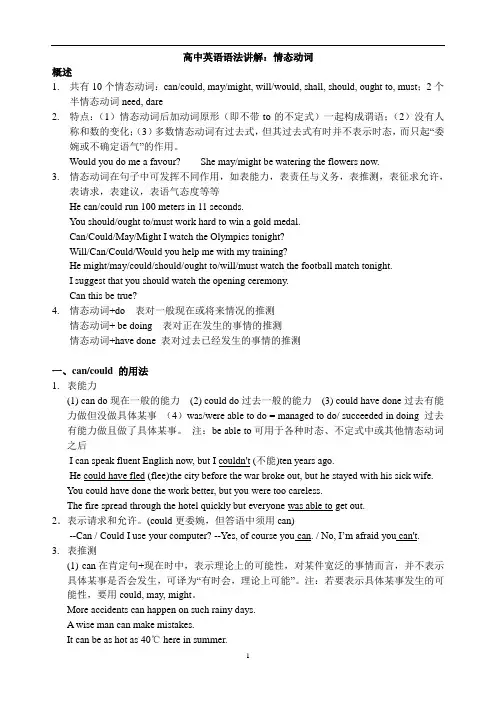
高中英语语法讲解:情态动词概述1.共有10个情态动词:can/could, may/might, will/would, shall, should, ought to, must;2个半情态动词need, dare2.特点:(1)情态动词后加动词原形(即不带to的不定式)一起构成谓语;(2)没有人称和数的变化;(3)多数情态动词有过去式,但其过去式有时并不表示时态,而只起“委婉或不确定语气”的作用。
Would you do me a favour? She may/might be watering the flowers now.3.情态动词在句子中可发挥不同作用,如表能力,表责任与义务,表推测,表征求允许,表请求,表建议,表语气态度等等He can/could run 100 meters in 11 seconds.You should/ought to/must work hard to win a gold medal.Can/Could/May/Might I watch the Olympics tonight?Will/Can/Could/Would you help me with my training?He might/may/could/should/ought to/will/must watch the football match tonight.I suggest that you should watch the opening ceremony.Can this be true?4.情态动词+do 表对一般现在或将来情况的推测情态动词+ be doing 表对正在发生的事情的推测情态动词+have done 表对过去已经发生的事情的推测一、can/could 的用法1.表能力(1) can do现在一般的能力(2) could do过去一般的能力(3) could have done过去有能力做但没做具体某事(4)was/were able to do = managed to do/ succeeded in doing 过去有能力做且做了具体某事。
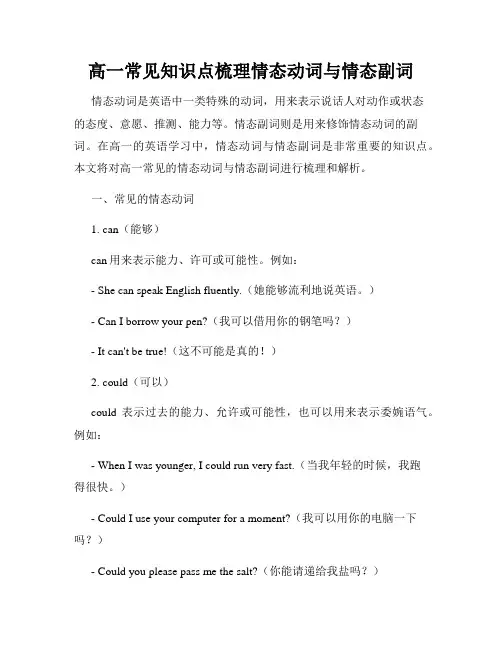
高一常见知识点梳理情态动词与情态副词情态动词是英语中一类特殊的动词,用来表示说话人对动作或状态的态度、意愿、推测、能力等。
情态副词则是用来修饰情态动词的副词。
在高一的英语学习中,情态动词与情态副词是非常重要的知识点。
本文将对高一常见的情态动词与情态副词进行梳理和解析。
一、常见的情态动词1. can(能够)can用来表示能力、许可或可能性。
例如:- She can speak English fluently.(她能够流利地说英语。
)- Can I borrow your pen?(我可以借用你的钢笔吗?)- It can't be true!(这不可能是真的!)2. could(可以)could表示过去的能力、允许或可能性,也可以用来表示委婉语气。
例如:- When I was younger, I could run very fast.(当我年轻的时候,我跑得很快。
)- Could I use your computer for a moment?(我可以用你的电脑一下吗?)- Could you please pass me the salt?(你能请递给我盐吗?)3. may(可能)may表示可能性、允许或请求的委婉语气。
例如:- It may rain tomorrow, so take your umbrella with you.(明天可能会下雨,所以记得带上雨伞。
)- May I go to the bathroom?(我可以去洗手间吗?)- May I have another piece of cake, please?(请问我可以再来一块蛋糕吗?)4. might(可能)might用来表示较小的可能性或建议。
例如:- It might rain later, so you should bring a raincoat.(天气可能会下雨,所以你应该带一件雨衣。
)- You might want to try the new restaurant downtown.(你可以试试市区的那家新餐厅。
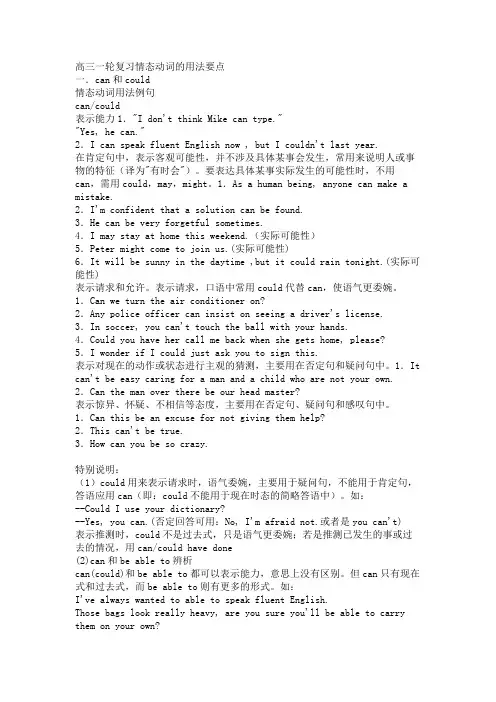
高三一轮复习情态动词的用法要点一.can和could情态动词用法例句can/could表示能力1."I don't think Mike can type.""Yes, he can."2.I can speak fluent English now , but I couldn't last year.在肯定句中,表示客观可能性,并不涉及具体某事会发生,常用来说明人或事物的特征(译为"有时会")。
要表达具体某事实际发生的可能性时,不用can,需用could,may,might。
1.As a human being, anyone can make a mistake.2.I'm confident that a solution can be found.3.He can be very forgetful sometimes.4.I may stay at home this weekend.(实际可能性)5.Peter might come to join us.(实际可能性)6.It will be sunny in the daytime ,but it could rain tonight.(实际可能性)表示请求和允许。
表示请求,口语中常用could代替can,使语气更委婉。
1.Can we turn the air conditioner on?2.Any police officer can insist on seeing a driver's license.3.In soccer, you can't touch the ball with your hands.4.Could you have her call me back when she gets home, please?5.I wonder if I could just ask you to sign this.表示对现在的动作或状态进行主观的猜测,主要用在否定句和疑问句中。

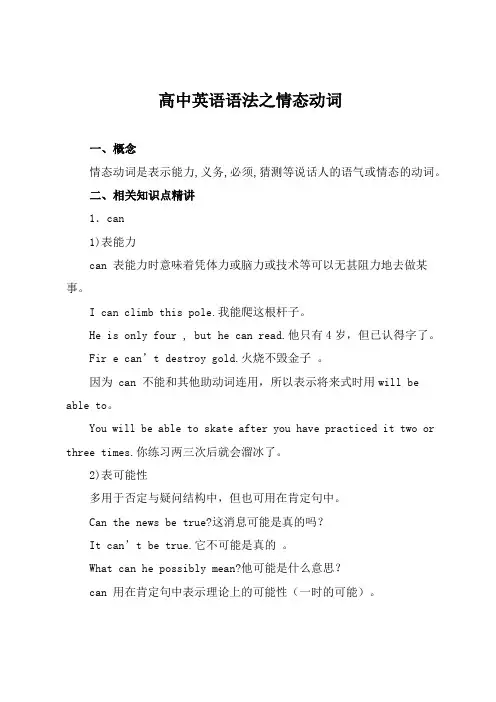
高中英语语法之情态动词一、概念情态动词是表示能力,义务,必须,猜测等说话人的语气或情态的动词。
二、相关知识点精讲1.can1)表能力can 表能力时意味着凭体力或脑力或技术等可以无甚阻力地去做某事。
I can climb this pole.我能爬这根杆子。
He is only four , but he can read.他只有4岁,但已认得字了。
Fir e can’t destroy gold.火烧不毁金子。
因为 can 不能和其他助动词连用,所以表示将来式时用will be able to。
You will be able to skate after you have practiced it two or three times.你练习两三次后就会溜冰了。
2)表可能性多用于否定与疑问结构中,但也可用在肯定句中。
Can the news be true?这消息可能是真的吗?It can’t be true.它不可能是真的。
What can he possibly mean?他可能是什么意思?can 用在肯定句中表示理论上的可能性(一时的可能)。
Attending the ball can be very exciting.The road can be blocked.这条路可能会不通的。
may 在肯定句中表示现实的可能性。
The road may be blocked.这条路可能不通了。
3)表示允许(和 may 意思相近)常见于口语。
Can (May) I come in ?我能进来吗?Can I smoke here ?我可以在这里抽烟吗?2.could 的用法1)表过去的可能和许可,(多用于间接引语中)At that time we thought the story could not be true.那时我们认为所说的事不可能是真的。
Father said I could swim in the river.爸爸说我可以在河里游泳。
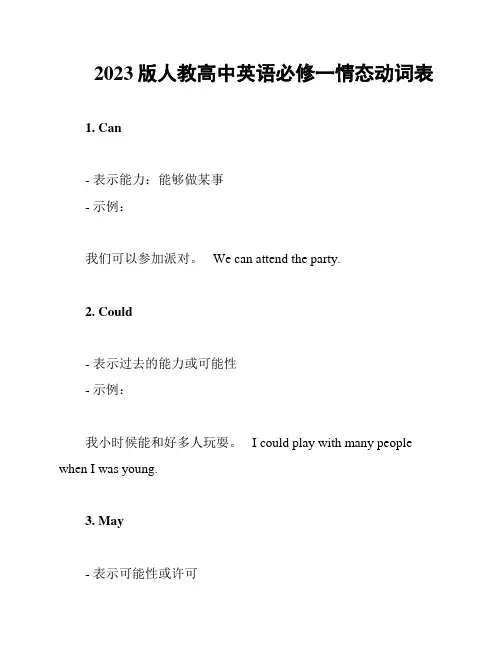
2023版人教高中英语必修一情态动词表1. Can- 表示能力:能够做某事- 示例:我们可以参加派对。
We can attend the party.2. Could- 表示过去的能力或可能性- 示例:我小时候能和好多人玩耍。
I could play with many people when I was young.3. May- 表示可能性或许可- 示例:4. Might- 表示微弱的可能性或许可- 示例:我们可以去公园玩,但也许会下雨。
We might go to the park, but it might rain.5. Must- 表示必须、肯定或推测- 示例:我们必须遵守学校的规定。
We must follow the school's regulations.6. Shall- 表示征求意见或提议- 示例:我们明天去游泳,好吗? Shall we go swimming tomorrow?7. Should- 表示应该、建议或责任- 示例:我们应该关心环境保护。
We should care about environmental protection.8. Will- 表示将来的动作、意图或意愿- 示例:我们明天会去购物。
We will go shopping tomorrow.9. Would- 表示愿意、过去的意愿或虚拟条件- 示例:如果我有时间,我会帮你。
If I had time, I would help you.10. Ought to- 表示应该、理应- 示例:你应该尽早开始学习。
You ought to start studying early.。
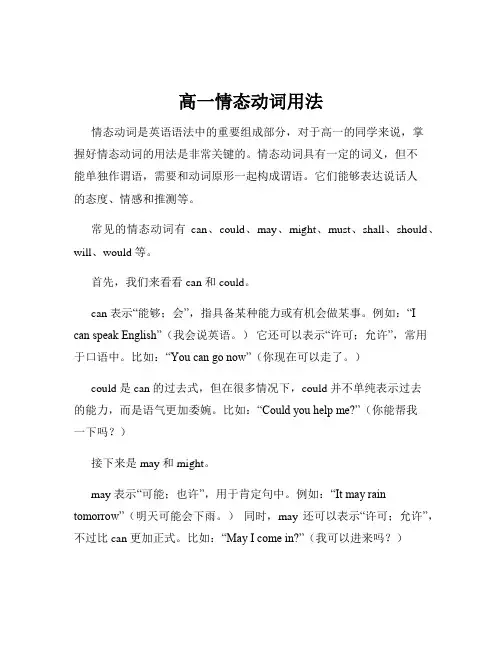
高一情态动词用法情态动词是英语语法中的重要组成部分,对于高一的同学来说,掌握好情态动词的用法是非常关键的。
情态动词具有一定的词义,但不能单独作谓语,需要和动词原形一起构成谓语。
它们能够表达说话人的态度、情感和推测等。
常见的情态动词有can、could、may、might、must、shall、should、will、would 等。
首先,我们来看看 can 和 could。
can 表示“能够;会”,指具备某种能力或有机会做某事。
例如:“I can speak English”(我会说英语。
)它还可以表示“许可;允许”,常用于口语中。
比如:“You can go now”(你现在可以走了。
)could 是 can 的过去式,但在很多情况下,could 并不单纯表示过去的能力,而是语气更加委婉。
比如:“Could you help me?”(你能帮我一下吗?)接下来是 may 和 might。
may 表示“可能;也许”,用于肯定句中。
例如:“It may rain tomorrow”(明天可能会下雨。
)同时,may 还可以表示“许可;允许”,不过比 can 更加正式。
比如:“May I come in?”(我可以进来吗?)might 是 may 的过去式,语气比 may 更加不确定和委婉。
例如:“He might be at home”(他也许在家。
)然后是 must。
must 表示“必须;一定”,强调主观上的必要性。
例如:“You must finish your homework before watching TV”(你必须在看电视之前完成作业。
)但要注意,must 的否定形式 mustn't 表示“禁止;不许”。
再来说说 shall 和 should。
shall 用于第一人称,表示征求对方的意见或向对方提出建议。
比如:“Shall we go shopping this afternoon?”(我们今天下午去购物好吗?)should 表示“应该;应当”,常用来给出建议或表达义务。
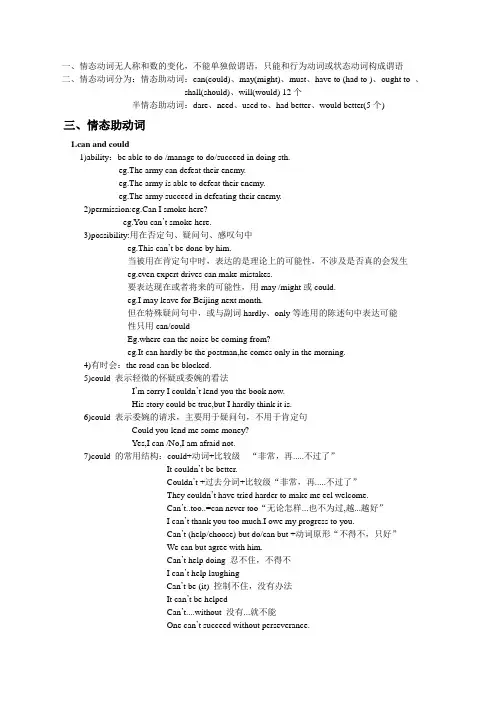
一、情态动词无人称和数的变化,不能单独做谓语,只能和行为动词或状态动词构成谓语二、情态动词分为:情态助动词:can(could)、may(might)、must、have to (had to )、ought to 、shall(should)、will(would) 12个半情态助动词:dare、need、used to、had better、would better(5个)三、情态助动词1.can and could1)ability:be able to do /manage to do/succeed in doing sth.eg.The army can defeat their enemy.eg.The army is able to defeat their enemy.eg.The army succeed in defeating their enemy.2)permission:eg.Can I smoke here?eg.You can’t smoke here.3)possibility:用在否定句、疑问句、感叹句中-eg.This can’t be done by him.当被用在肯定句中时,表达的是理论上的可能性,不涉及是否真的会发生eg.even expert drives can make mistakes.要表达现在或者将来的可能性,用may /might或could.eg.I may leave for Beijing next month.但在特殊疑问句中,或与副词hardly、only等连用的陈述句中表达可能性只用can/couldEg.where can the noise be coming from?eg.It can hardly be the postman,he comes only in the morning.4)有时会:the road can be blocked.5)could 表示轻微的怀疑或委婉的看法I’m sorry I couldn’t lend you the book now.His story could be true,but I hardly think it is.6)could 表示委婉的请求,主要用于疑问句,不用于肯定句Could you lend me some money?Yes,I can /No,I am afraid not.7)could 的常用结构:could+动词+比较级“非常,再.....不过了”It couldn’t be better.Couldn’t +过去分词+比较级“非常,再.....不过了”They couldn’t have tried harder to make me eel welcome.Can’t..too..=can never too“无论怎样...也不为过,越...越好”I can’t thank you too much.I owe my progress to you.Can’t (help/choose) but do/can but +动词原形“不得不,只好”We can but agree with him.Can’t help doing 忍不住,不得不I can’t help laughingCan’t be (it) 控制不住,没有办法It can’t be helpedCan’t....without 没有...就不能One can’t succeed without perseverance.2.may and might1)permission:May I use your pen?Yes,you may./No,you may not.2)Possibility:用于推测,表示不确定,不用于疑问句中She may know Tom’s address.出现I’m afraid.I’m not sure等表示不确定时,常用may/might.I’m afraid he might not come to attend the meeting today.从语气上判断,may表示的可能性比might 大,might更多的表示怀疑He may be very busy now.He might be very busy now.3)用于让步状语从句中However hard you may study,you cannot master English in a month.4)用于祈使句,表示祝愿May you succeed!5)might 常用于表示轻微的责备和委婉的请求You might post the letter for me if you are going near a post box.You might have let me know before!6)习惯用法:may as well do”理所当然,有足够的理由”She may be proud of her sonMay /might (just) as well do=had better do(最好)You might as well stay at home tonight.May/might as well+do A+as+do+B”与其做B不如做A”You might as well throw the money away as lend it to him.One may as well not know a thing at all as know it but imperfectly3.must and have to1)表示义务,一定要,必须You must arrive in good time.The meeting is very important.2)表示肯定性或难以避免,必然会,肯定会All men must die.3)must 表示有把握的推测,一定是,准时Must do/must be doing/must have doneThe tall fellow must be a basketball player.Let’s have something.You must be starving.He must have received mu letter which has mailed last week.4)must 表示非要,偏要,常以第二人称为主语,意指不耐或令人不愉快的事情,用于其他人称,表示主语固执,意为偏偏Why must you buy that car?Jane was never a pleasant young girl.After you gave her your advice,she must goand do the opposite.5)must 的三种否定形式表示不可能must be --can’t be must have done--can’t have doneYou must have met him before.You can’t have met him before.表示不必must do--need not to/don’t have toWe must get up at six tomorrow morning.We don’t have to get up at six tomorrow morning.表示决不能,严禁must--mustn’tYou mustn’t park your car here.6)回答以must提问的句子Must we clean all the rooms?Yes ,you must/No ,you don’t have to/No ,you needn’t7)must 可做名词,表示必须有的东西,必须做的事Warm clothes are a must in the mountains.8)must和have to 表示必须时,有一下差别Must 表示的是说话人主观的看法,而have to则往往强调客观需要The play is not interesting ,I really must go now.I have to work when I was your age.Must 一般只表现在,have to 则有更多的时态。
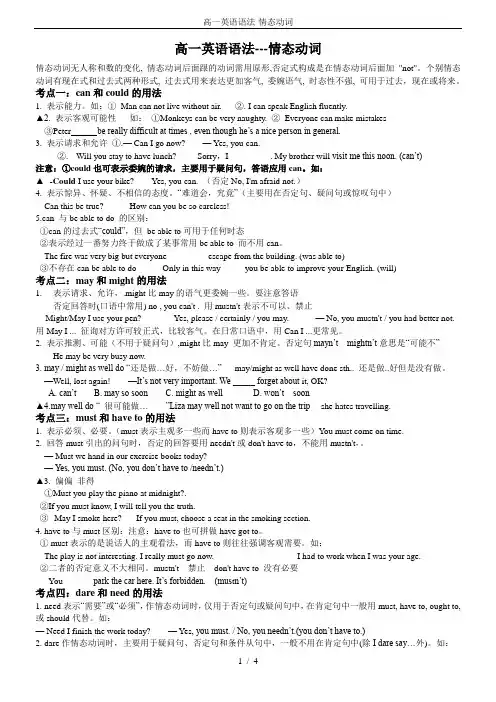
高一英语语法---情态动词情态动词无人称和数的变化, 情态动词后面跟的动词需用原形,否定式构成是在情态动词后面加"not"。
个别情态动词有现在式和过去式两种形式, 过去式用来表达更加客气, 委婉语气, 时态性不强, 可用于过去,现在或将来。
考点一:can和could的用法1. 表示能力。
如:①Man can not live without air. ②. I can speak English fluently.▲2. 表示客观可能性如:①Monkeys can be very naughty. ②Everyone can make mistakes③Peter be really difficult at times , even though he’s a nice person in general.3. 表示请求和允许①.— Can I go now? — Yes, you can.②. --Will you stay to have lunch? -- Sorry,I _________. My brother will visit me this noon. (can’t)注意:①could也可表示委婉的请求,主要用于疑问句,答语应用can。
如:▲---Could I use your bike? ---Yes, you can. (否定No, I'm afraid not.)4. 表示惊异、怀疑、不相信的态度。
“难道会,究竟”(主要用在否定句、疑问句或惊叹句中)Can this be true? How can you be so careless!5.can 与be able to do 的区别:①can的过去式“could”,但be able to可用于任何时态②表示经过一番努力终于做成了某事常用be able to 而不用can。
The fire was very big but everyone _________escape from the building. (was able to)③不存在can be able to do Only in this way _____you be able to improve your English. (will)考点二:may和might的用法1.表示请求、允许,.might比may的语气更委婉一些。
高一英语情态动词情态动词是高考的重点考查项目,对学习情态动词的要求是:首先、了解情态动词各自的基本意义及用法,然后掌握情态动词表示推测的用法(其中重点是对表过去推测的用法)还要注意带有情态动词的反意疑问句的用法。
情态动词的特征:1.本身有词义,但完全。
因此不能独立作谓语,只能和动词原形一起构成谓语。
2.后接动词不定式一律不带to3.不随人称和数的变化。
情态动词各自的基本意义及用法表一、can 与could用法对比表表三、must与have to的用法对比表表六、shall与will的用法对比表表七:used to与would用法对比表情态动词表推测情态动词表推测的意义:1、大多数情态动词(除表‘能力、许可、意志’外),都可以表示推测,其程度有差异。
按其可能性程度的高低排列为:Must ﹥will ﹥would ﹥ought to ﹥ should ﹥ can ﹥ could﹥ may ﹥ might肯定完全可能很可能可能有可能2.注意区分情态动词的否定的含义:may not或许不、可能不 might not可能不 can’t 不可能mustn’t不许、禁止 shouldn’t不应该 needn’t 不必情态动词表推测的反意疑问句,简单来说,就是以情态动词后的时态为淮,如句子里有明确的时间状语,则以其为准。
以 must 为例:eg. 1. You must be hungry now, aren’t you?2. He must be watching TV , isn’t he ?3 Tom must have lived her for a long time, hasn’t he ?4. She must have arrived yesterday, didn’t she?注:如选择题中(以She must have arrived yesterday, didn’t she?为例)既有didn’t she又有hasn’t she则以didn’t she?为最佳答案。